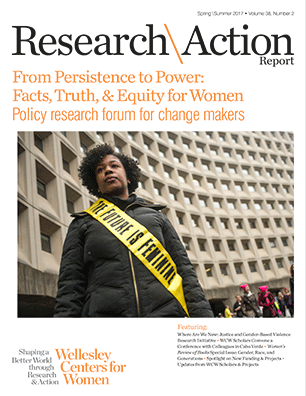Wellesley-Cabo Verde Convening
The Centre for Research and Training in (CIGEF) and the Wellesley Centers for Women (WCW) held a joint conference, Gender, Social Justice, and Women’s Empowerment, in Cabo Verde in February. Vanessa Britto, M.D., Wellesley College Medical Director; LaShawnda Lindsay, Ph.D., WCW research scientist; Layli Maparyan, Ph.D., the Katherine Stone Kaufmann ’67 Executive Director of WCW; and Linda M. Williams, Ph.D., WCW senior research scientist, were among the presenters. Attended by government officials, UN officers, academics, students, and representatives of numerous community organizations and NGOs, the conference symbolized the cementing of a partnership that has been growing since 2013. “Our joint conference reflected an important effort to work across the language barrier to share research and best practices related to issues facing women and girls worldwide,” Maparyan said. “Researchers, practitioners, and policymakers from Cabo Verde, the U.S., and other countries came together to learn together, converse about strategies, and build new working relationships.”
The conference convened experts who could work on different themes aiming at the same goal: social justice and the empowerment of women.
“As a result, those presentations have the potential to help us understand how to reduce poverty and socio-economic vulnerability,” said Clementina Fortado, Ph.D., CIGEF director. “The great news is related to the new vision on feminism and reflection about women in STEM.”
For CIGEF it was another very important step, Furtado noted, as the recommendations opened up horizon in regards to a new action research that can be carried out in the near future. “The engagement and the solidarity of women that have been in more privileged positions, and the involvement of men are the hope for social changes,” she said. “The changes can occur on the promotion of the most vulnerable women, which can result in reduction of gender inequality, and that can translate into a more inclusive and egalitarian society.”
“The visit to Cabo Verde further reinforced the WCW mantra that a world that is good for women is good for everyone—for all of the society—women, men and children,” said Williams. “One can see it clearly in this small island country, which developed from a legacy of slavery coupled with strength and resilience of the people. Starting with health care for women at all stages of the life course, those in both governmental and non-governmental organizations demonstrated the importance of working together for empowerment of the whole woman, that is, recognizing the need for justice, education, and economic and social equality. Not just one but ALL of these pieces must come together for women to be free from gender-based violence and free not only to survive but to thrive. As women thrive then Cabo Verde shall thrive.”
Williams noted that new ideas percolated, such as working together to identify and intervene in situations that are ripe for the expansion of sex trafficking and commercial sexual exploitation, as well as developing training, education, and social support opportunities for young women to find economic success in arts, science, and technology as alternatives to being forced into the sex trade.
This summer, Cecilia Barreto (Class of 2020), a WCW student research intern, supported by the Anchor Point Fellowships program at Wellesley College, is working with CIGEF in Cabo Verde on a study of gender relations in the context of immigration, as well as helping to build a database of research on Cabo Verdean families. This development has resulted from collaboration of the Cabo Verde Working Group at Wellesley College.


